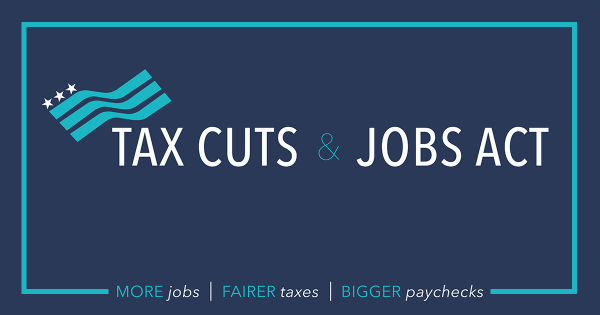
I don’t know how they did it. The House passed a terrible tax bill. The Senate passed one that was almost as bad. To reconcile the two bills a House and Senate Conference Committee was created. I had extremely low expectations. What they came out with was the revised Tax Cuts & Jobs Act (TCJA), and it is, quite frankly, a great bill for almost everyone.
If you want to read the full bill, you can do so here: http://www.cnn.com/2017/12/15/politics/text-read-tax-plan-republicans/index.html?iid=EL
Before I jump into the highlights, I want to make a few important points:
- As of this writing, it is not a law yet, so no changes have actually been made. It will likely become law before the end of the year, though, but current tax laws will be in place for your 2017 return that you will be working on in a few months.
- I am not a CPA or tax attorney, so nothing in this article should be construed as tax advice. This article is for informational purposes only. For information about your own taxes you should consult a tax professional.
- Page numbers refer to the page in the bill where you can find the information.
Let’s run through some highlights for individuals and families:
- Reduces all but two tax brackets (page 12):
Current Law 10% 15% 25% 28% 33% 35% 39.6% TCJA 10% 12% 22% 24% 32% 35% 37% - Increases the standard deduction to $12,000 for singles and $24,000 for married filing joint (MFJ) (page 17):
- With the increase in the standard deduction, personal exemptions are going away. Under current law you get a personal exemption of $4,050 per individual (which would lower your taxable income).
- If you choose to itemize, you can still deduct sales, income and property taxes up to $10,000 (page 81).
- If you choose to itemize you can still deduct mortgage interest for home values up to $750,000 (page 78).
- Deductions for the interest on a home equity lines of credit, however, will no longer be deductible.
- Increases the Child Tax Credit to $2,000 per child, with $1,400 of that being refundable for most taxpayers (page 43).
- College savings plans (529 plans) may now be used for elementary, secondary, homeschool and higher education (page 63).
- Qualified moving expenses are no longer deductible unless you are part of the Armed Forces (pages 102, 110).
- Alimony is no longer deductible to the payor (page 100).
- Eliminates most personal casualty and theft losses from itemized deductions (page 81).
- Because taxes will be easier to file for many (most will take the standard deduction) you can no longer deduct the cost of paying someone to prepare your taxes (page 99).
- Simplifies the rules for the Alternative Minimum Tax and essentially doubles the amount you can pass to your heirs income tax-free (Estate or Death Tax).
- If you have a pass-through business (S corp, LLC, Partnership, or Sole Proprietorship) all gains made in the business currently pass through to your individual tax form where you pay taxes on the gain as though it were income. Under the TCJA you can reduce the amount that flows through by 20% (1). For example, if you have a home-based business and you make $20,000, only $16,000 of that will flow through to your personal taxes. Because of this and other tax-friendly portions of the law, the National Federation of Independent Business, who initially opposed the House and Senate bills, is in full support of the revised bill and is encouraging both Chambers to pass the bill quickly (2).
- The tax rate for corporations is reduced from 35% to 21%.
There are several provisions which were in either the House or Senate bill that did not make it into the final bill. These include:
- Modification of the exclusion of the gain or sale of a principal residence (Sec 121 of the tax bill):
- Currently if you live in your home for 2 out of the last 5 years you can exclude the gain up to $250K (single) or $500K (MFJ).
- Both the House and Senate planned to increase this to 5 out of the last 8 years.
- The joint bill contains no provision for this, so it will stay at 2 out of 5 years (page 109).
- Qualified tuition reduction for graduate students continues to be excluded from income (page 68).
- Up to $5,250 of employer provided education assistance continues to be excluded from income (page 70).
- The Adoption Assistance Credit is retained (page 112).
- Continues to allow taxpayers to deduct student loan interest and tuition and fees, and the American Opportunity Credit is retained.
It is important to note that all individual provisions expire after 2025. The plan is that the next President and Congress will extend these provisions for all individuals and families. It is a bit of a gamble, but it is the only way, under current rules, to pass the bill with a simple majority.
What you probably want to know is, what will this bill do to your taxes? People much smarter than me in taxation will figure that out, but in the meantime, there are several calculators you can use to estimate your tax burden. Again, this is an estimate, not a guarantee. I used two calculators to run several scenarios:
- To run scenarios under the current tax law: https://www.moneyhelpcenter.com/taxes/calculate/2017-federal-income-tax-calculator/#results
- To run scenarios under the TCJA: https://www.calcxml.com/calculators/trump-tax-reform-calculator?skn=#results
Here is what I found for five scenarios. I ran all with the standard deduction (3):
Scenario 1: Married Filing Jointly (MFJ) with four children; $85,000 in ordinary income.
- Current tax liability: $2,288
- TCJA tax liability: $0
- Savings of $2,288 under TCJA
Scenario 2: MFJ with 2 children; $75,000 in ordinary income; $200 in investment income.
- Current: $3,982
- TCJA: $1,739
- Savings: $2,243
Scenario 3: Single; $75,000 income; $200 investment income.
- Current: $11,889
- TCJA: $9,800
- Savings: $2,089
Scenario 4: Single, $55,000 ordinary income; $20,000 home-business income; $200 investment income.
- Current: $11,889
- TCJA: $8,920
- Savings: $2,969
Scenario 5: MFJ with 5 children, $100,000 ordinary income; $20,000 home-business income; $200 investment income.
- Current: $6,715
- TCJA: $2,119
- Savings: $4,596
As more information is released I will continue to update this article and post updates on my Facebook page at https://www.facebook.com/RyanHLawBlog/.
(1) This provision is eliminated for higher-income individuals and certain service businesses.
(2) https://www.nfib.com/content/press-release/national/small-business-supports-conference-tax-bill/
(3) These calculators get updated as more information becomes available. If you run these same scenarios at a different times you might get slightly different results. If the numbers change dramatically I will update the article. The numbers are correct as on December 17, 2017.

Well done Ryan.
Have a great day and a Merry Christmas
David Nuffer
Thanks for sharing, Ryan! It looks like your opinion has changed slightly since the initial proposal. I enjoy reading your posts!
Jordan – it has completely changed. The House bill and Senate bill really were terrible bills – you can see from my analysis about the House bill in the previous article. Thanks for reading and commenting!
Thank you Ryan for another great post. You’re a great resource for this Program Developer and practitioner. Merry Christmas and Happy New Year!